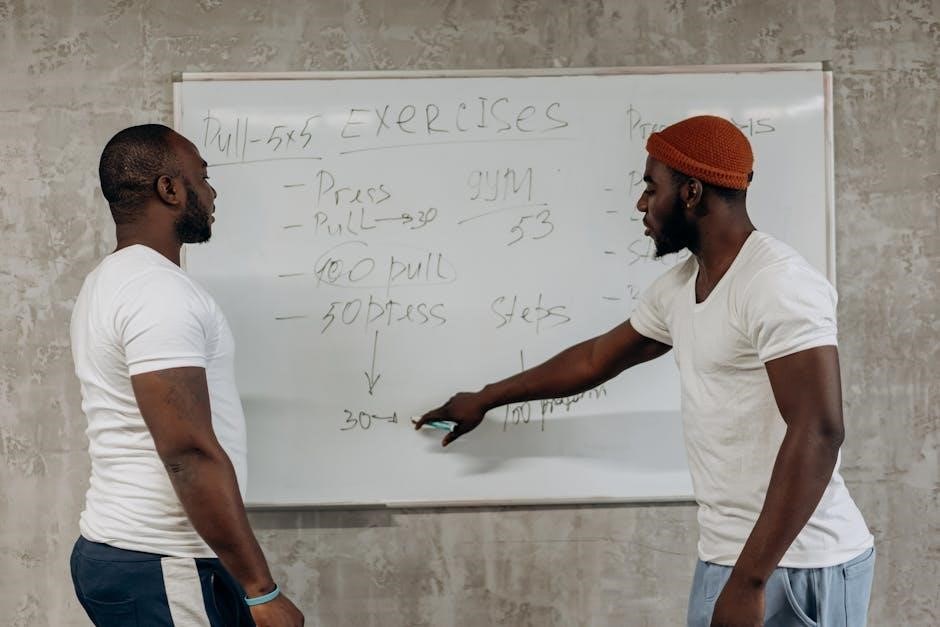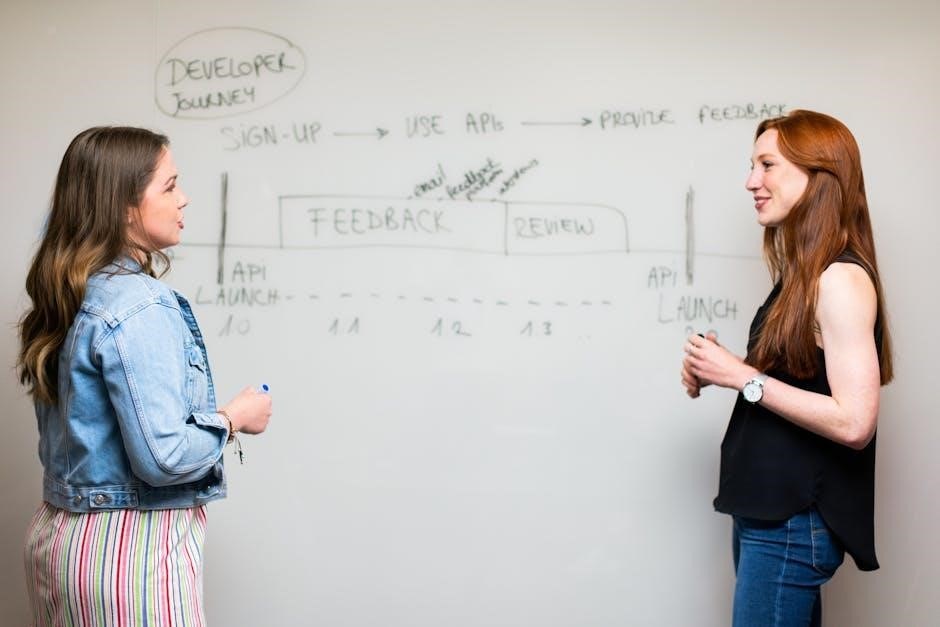The Royal Marines Training Plan is a comprehensive 12-week program designed to prepare recruits physically and mentally. It includes the Recruit Orientation Phase (ROP) to build resilience and ensure recruits meet the elite standards of the Royal Marines.
Overview of the Royal Marines Training Program
The Royal Marines Training Program is a structured 12-week course designed to transform civilians into elite military personnel. It begins with the Recruit Orientation Phase (ROP)‚ focusing on physical conditioning and mental preparation. The program progresses through core skills‚ advanced combat training‚ and culminates in a final exercise. Daily routines include strength-building exercises‚ endurance training‚ and tactical drills. The curriculum emphasizes teamwork‚ leadership‚ and resilience‚ ensuring recruits meet the high standards of the Royal Marines. The plan is detailed in a downloadable PDF‚ offering a clear roadmap for aspiring recruits to prepare and succeed. This comprehensive approach ensures recruits are ready for the challenges of modern military service.
Importance of the Training Plan for Aspiring Recruits
The Royal Marines Training Plan is crucial for aspiring recruits as it provides a clear‚ structured pathway to achieving the elite standards required for service. The 12-week program ensures recruits are physically and mentally prepared‚ building resilience and adaptability. By following the detailed guide‚ recruits can develop the skills and mindset needed to excel in demanding environments. The plan also fosters teamwork and leadership‚ essential for military success. As outlined in the PDF‚ the training plan equips recruits with the tools to overcome challenges and thrive in their roles. It is a vital resource for anyone aiming to join the Royal Marines‚ ensuring they are fully prepared for the rigors of training and future operations.

Phases of Royal Marines Training
The Royal Marines Training Plan consists of a structured 12-week program divided into phases‚ including Recruit Orientation‚ Core Skills‚ Advanced Combat‚ and Final Assessment.
Phase 1: Recruit Orientation Phase (ROP)
The Recruit Orientation Phase (ROP) is the initial stage of Royal Marines training‚ designed to acclimate new recruits to military life. This phase focuses on building foundational fitness levels through sub-maximal physical activities‚ ensuring recruits are prepared for the rigors ahead. ROP introduces basic military protocols‚ teamwork‚ and mental resilience. Recruits learn essential skills such as uniform maintenance‚ drill‚ and core values of the Royal Marines. This phase is crucial for setting the tone for the rest of the training program‚ fostering camaraderie‚ and instilling discipline. The ROP ensures recruits are mentally and physically ready to progress to more advanced training phases.
Phase 2: Core Skills Training
Phase 2 of the Royal Marines Training Plan focuses on developing essential military skills and capabilities. Recruits learn fieldcraft‚ navigation‚ and basic first aid‚ crucial for operational effectiveness. This phase emphasizes teamwork‚ discipline‚ and the ability to operate in challenging environments. Recruits are introduced to tactical procedures‚ including patrolling and shelter construction‚ while continuing to build physical fitness through structured exercises. Mental resilience is further strengthened through exposure to simulated combat scenarios. By the end of this phase‚ recruits demonstrate improved confidence and proficiency in core military skills‚ preparing them for the advanced training ahead. This phase is pivotal in transforming civilians into capable military personnel‚ ready to tackle the demands of Royal Marines service.
Phase 3: Advanced Combat Training
Phase 3 of the Royal Marines Training Plan delves into advanced combat skills‚ preparing recruits for real-world operations. This phase focuses on refining tactical abilities‚ including weapon handling‚ close quarters combat‚ and advanced fieldcraft. Recruits engage in live-fire exercises and complex mission simulations‚ testing their decision-making under pressure. Leadership skills are further developed as recruits take on roles within teams‚ fostering accountability and cohesion. Mental resilience is pushed to the limit through demanding scenarios designed to replicate operational challenges. This phase ensures recruits are adept at navigating unpredictable environments and executing precise‚ effective actions. By mastering these advanced skills‚ recruits solidify their readiness for the final stages of training and future deployments.
Phase 4: Final Exercise and Assessment
Phase 4 is the culmination of the Royal Marines Training Plan‚ where recruits undergo a rigorous final exercise known as the “Confirming the Plan.” This phase evaluates their mastery of skills acquired throughout training‚ focusing on tactical execution‚ survival techniques‚ and leadership under extreme conditions. Recruits are tested in simulated operational environments‚ requiring precise decision-making and teamwork. The assessment includes live-fire drills‚ navigation challenges‚ and scenario-based evaluations to ensure readiness for active duty. Successful completion of this phase signifies a recruit’s transformation into a capable Royal Marine‚ ready to face real-world challenges. This final test is a comprehensive measure of their physical‚ mental‚ and emotional preparedness. Passing this phase earns recruits the coveted Green Beret‚ marking their official entry into the Royal Marines.
Phase 5: Post-Graduation Training
Following graduation‚ Royal Marines enter Phase 5‚ a specialized post-graduation training phase. This phase focuses on advanced military skills tailored to specific roles within the Corps. Recruits attend courses such as the Mountain Leader Training‚ Arctic Warfare‚ and Amphibious Training‚ enhancing their expertise in diverse operational environments. Additionally‚ they engage in continuous physical conditioning to maintain elite fitness levels. This phase also includes mentorship programs‚ where new Marines learn from experienced personnel‚ fostering leadership and camaraderie. The training is designed to refine their abilities further‚ ensuring they are fully prepared for the demands of active duty and capable of contributing effectively to Royal Marines operations worldwide. This phase solidifies their readiness as professional soldiers;

Physical Fitness Requirements
Royal Marines training emphasizes a structured progressive physical fitness program. Recruits engage in daily exercises‚ focusing on strength‚ endurance‚ and agility to achieve peak physical condition.
Daily Exercise Routines
Daily exercise routines in the Royal Marines training plan are structured to enhance strength‚ endurance‚ and agility. Recruits engage in a mix of strength training‚ aerobic exercises‚ and agility drills. Each day focuses on specific skills‚ such as push-ups‚ squats‚ and sprints‚ to build muscular endurance. Functional training‚ including obstacle courses‚ is incorporated to simulate real-world scenarios. Team-building exercises like group runs and buddy carries foster camaraderie and mental resilience. The routines are progressive‚ increasing in intensity as recruits advance through training phases. Proper form and technique are emphasized to prevent injuries and ensure optimal performance. These daily exercises are crucial for preparing recruits for the demands of advanced combat training and real-world operations. Consistency and discipline are key to meeting the elite standards of the Royal Marines.
Progressive Physical Training Program
The progressive physical training program in the Royal Marines is designed to gradually increase recruits’ strength‚ endurance‚ and agility over time. Each week introduces more demanding exercises‚ ensuring continuous improvement without causing overtraining injuries. The program begins with foundational fitness assessments to determine individual baselines. As recruits progress‚ they engage in dynamic workouts tailored to their improvement levels‚ incorporating elements like weightlifting‚ plyometrics‚ and cardiovascular exercises. The structured progression ensures that recruits build the physical resilience needed for advanced combat training and real-world missions. This systematic approach helps recruits achieve peak physical condition‚ enabling them to meet the rigorous demands of the Royal Marines. The program’s adaptability ensures it remains effective for all fitness levels‚ fostering overall physical excellence.
Role of Strength and Endurance in Training
Strength and endurance are cornerstones of the Royal Marines Training Plan‚ ensuring recruits can perform demanding tasks under pressure. Building muscular strength enhances the ability to carry heavy equipment and withstand physical stress‚ while endurance enables prolonged operational performance. The program incorporates exercises like weightlifting‚ plyometrics‚ and long-distance runs to develop these attributes progressively. Endurance training focuses on cardiovascular health and stamina‚ crucial for sustained efforts in challenging environments. Strength training‚ on the other hand‚ targets muscle development to improve power and stability. Together‚ these components prepare recruits for the physical demands of combat and field operations‚ ensuring they can operate effectively in diverse and arduous conditions. The combination of strength and endurance is vital for meeting the elite standards of the Royal Marines.

Mental and Emotional Preparation
Mental resilience training is essential for building emotional strength and focus. Techniques like mindfulness and stress management are used to prepare recruits for the psychological demands of service.
Mental Resilience Training
Mental resilience training is a cornerstone of the Royal Marines Training Plan‚ designed to equip recruits with the emotional strength to handle stress and adversity. Through structured exercises and psychological conditioning‚ recruits learn to maintain focus and composure under pressure. Techniques such as mindfulness‚ cognitive restructuring‚ and stress management are integrated into daily routines. These methods help recruits develop a growth mindset‚ enabling them to embrace challenges and recover from setbacks. The program also emphasizes teamwork and shared goals‚ fostering a sense of camaraderie that bolsters individual resilience. By building mental fortitude‚ the Royal Marines prepare recruits to perform effectively in high-stakes environments‚ ensuring they can thrive under the physical and psychological demands of military service.
Teamwork and Leadership Development
Teamwork and leadership development are integral to the Royal Marines Training Plan‚ fostering collaboration and command skills essential for mission success. Recruits participate in group exercises that require coordination‚ communication‚ and mutual support to achieve shared objectives. Leadership roles are rotated to build confidence and decision-making abilities. These activities simulate real-world scenarios‚ teaching recruits to lead under pressure while relying on their team. The program emphasizes trust‚ adaptability‚ and problem-solving‚ preparing individuals to inspire and guide others effectively. By nurturing these qualities‚ the Royal Marines cultivate capable leaders who can thrive in dynamic and challenging environments‚ ensuring operational success and strong unit cohesion.
Strategies for Overcoming Challenges
The Royal Marines Training Plan incorporates proven strategies to help recruits overcome challenges‚ fostering mental resilience and adaptability. Techniques such as positive visualization‚ mindfulness‚ and reframing challenges as opportunities for growth are emphasized. Recruits learn to break down complex tasks into manageable steps‚ reducing overwhelm and building confidence. Teamwork is also a critical component‚ as collaborating with others leverages collective strength and problem-solving abilities. Instructors encourage open communication and peer support to address setbacks. Additionally‚ recruits engage in controlled exposure to stressors‚ teaching them to remain calm and focused under pressure. These strategies empower individuals to navigate obstacles effectively‚ both during training and in real-world operations‚ ensuring they emerge resilient and capable leaders.
Nutrition and Recovery
Nutrition and recovery are fundamental to the Royal Marines Training Plan‚ ensuring recruits maintain optimal energy levels and resilience throughout the demanding program.
Importance of Proper Diet for Recruits
A proper diet is essential for Royal Marines recruits to meet the physical and mental demands of training. It ensures optimal energy levels‚ supports muscle recovery‚ and enhances endurance. A balanced diet rich in proteins‚ carbohydrates‚ and healthy fats is critical for building strength and maintaining performance. Hydration is also emphasized to prevent fatigue and maintain focus. Recruits are advised to avoid unhealthy snacks and prioritize nutrient-dense meals. Proper nutrition not only aids in recovery but also boosts mental clarity‚ enabling recruits to handle the rigorous training schedule effectively. The Royal Marines Training Plan includes detailed dietary guidelines to help recruits fuel their bodies for success.
Recovery Techniques for Optimal Performance
Recovery is a critical component of the Royal Marines Training Plan‚ ensuring recruits can perform at their best. Adequate sleep‚ hydration‚ and nutrition are emphasized to aid muscle repair and energy replenishment. Stretching and mobility exercises are incorporated to improve flexibility and reduce injury risk. Mental recovery techniques‚ such as mindfulness and relaxation‚ are also encouraged to maintain focus and resilience. The program highlights the importance of balancing intense training with proper rest to optimize physical and mental performance. By prioritizing recovery‚ recruits can adapt to the demands of training and achieve their full potential. These strategies are designed to support long-term success and readiness for operational duties.

Combat and Tactical Skills Training
The Royal Marines Training Plan includes advanced combat and tactical skills‚ focusing on weapon handling‚ fieldcraft‚ and combat tactics. Recruits learn to operate in various environments‚ ensuring mission readiness.
Weapon Handling and Marksmanship
Weapon handling and marksmanship are critical components of the Royal Marines Training Plan. Recruits learn to safely and effectively operate various firearms‚ starting with the SA80A2 rifle. Training progresses from basic handling to advanced shooting techniques‚ emphasizing accuracy and speed. Marksmanship principles are reinforced through structured drills and live-fire exercises. Recruits also practice shooting in diverse environments‚ including urban and woodland settings‚ to simulate real-world scenarios. Night shooting exercises enhance situational awareness and adaptability. Instructors provide continuous feedback to refine skills‚ ensuring recruits meet the high standards of the Royal Marines. Mastery of weapon handling and marksmanship is essential for operational readiness and mission success.
Tactical Movement and Fieldcraft
Tactical movement and fieldcraft are essential skills taught to Royal Marines recruits. Training focuses on navigating diverse terrains‚ using cover‚ and maintaining concealment. Recruits learn to move stealthily‚ avoiding detection while reaching objectives. Fieldcraft includes constructing shelters‚ setting up observation posts‚ and using camouflage effectively. These skills are honed through practical exercises in both urban and rural environments. Instructors emphasize situational awareness and adaptability‚ teaching recruits to respond to dynamic scenarios. Mastery of these techniques ensures operational effectiveness‚ enabling recruits to operate confidently in hostile or austere conditions. Tactical movement and fieldcraft are vital for mission success and survival‚ embedding core competencies that define the Royal Marines’ operational excellence.
Close Combat and Self-Defense
Close combat and self-defense training is a critical component of the Royal Marines curriculum. Recruits learn hand-to-hand combat techniques‚ weapon retention‚ and defensive strategies to protect themselves in high-threat situations. Training emphasizes quick decision-making and controlled aggression. Recruits practice disarming opponents‚ escaping restraints‚ and neutralizing threats in confined spaces. These skills are reinforced through scenario-based exercises‚ simulating real-world combat scenarios. The aim is to build confidence and instinctive reactions‚ ensuring recruits can safeguard themselves and others while executing missions. This rigorous training prepares Royal Marines to handle unexpected challenges with precision and composure‚ embodying their reputation as elite warriors.

Assessment and Evaluation
Assessment and evaluation are critical to ensure recruits meet Royal Marines standards. Regular fitness tests and tactical drills measure progress‚ while instructors provide feedback to refine skills and build confidence.
Regular Fitness Tests and Assessments
Regular fitness tests and assessments are integral to the Royal Marines training plan‚ ensuring recruits meet the elite standards required for service. These evaluations occur throughout the 12-week program‚ focusing on endurance‚ strength‚ and agility. Recruits undergo rigorous physical challenges‚ including timed runs‚ obstacle courses‚ and swim tests‚ to measure their progress. Additionally‚ tactical drills and combat simulations are assessed to evaluate readiness for operational scenarios. Instructors provide detailed feedback after each test‚ highlighting areas for improvement. These assessments not only gauge individual performance but also ensure the collective readiness of the unit‚ maintaining the Royal Marines’ reputation for excellence. Consistent evaluation ensures only the most capable recruits advance‚ embodying the corps’ high standards.
Performance Reviews and Feedback
Performance reviews and feedback are essential components of the Royal Marines training plan‚ ensuring recruits meet the elite standards required for service. Instructors conduct regular evaluations throughout the 12-week program‚ assessing recruits’ skills‚ tactical proficiency‚ and leadership abilities. Feedback is constructive and specific‚ highlighting strengths and identifying areas for improvement. This process helps recruits refine their performance and build confidence. Additionally‚ self-assessment tools are integrated‚ allowing recruits to reflect on their progress and set personal goals. The emphasis on continuous improvement ensures that only the most capable and dedicated individuals advance‚ upholding the Royal Marines’ renowned reputation for excellence. This structured approach to feedback fosters growth and prepares recruits for the challenges of military life.
The Royal Marines Training Plan is a rigorous‚ transformative journey that equips recruits with the resilience‚ skills‚ and mental toughness needed to excel as elite Marines.
Final Thoughts on the Royal Marines Training Plan
The Royal Marines Training Plan is a transformative journey that pushes recruits to their limits‚ fostering resilience‚ leadership‚ and elite combat readiness. It combines rigorous physical‚ mental‚ and tactical challenges to ensure recruits meet the highest standards. The program’s progressive structure‚ starting with the Recruit Orientation Phase (ROP)‚ builds a strong foundation for future success. By emphasizing adaptability‚ teamwork‚ and mental toughness‚ it prepares individuals for the demands of modern warfare and beyond. The plan’s focus on holistic development ensures recruits emerge as capable‚ disciplined‚ and elite Marines. Completing this program is a testament to one’s dedication and perseverance‚ setting the stage for a distinguished career in the Royal Marines.
Encouragement for Future Recruits
Embarking on the Royal Marines Training Plan is a life-changing journey that demands courage‚ determination‚ and unwavering commitment. While the path is challenging‚ the rewards are immense. You will be pushed to your limits‚ but this is where growth happens. The program is designed to forge resilient‚ capable‚ and elite individuals ready to serve with distinction. Surround yourself with supportive teammates and mentors who will help you navigate the journey. Stay focused on your goals and remind yourself why you started. Every obstacle overcome brings you closer to earning the prestigious title of a Royal Marine. Embrace the process‚ stay disciplined‚ and believe in your potential. The end result will be a sense of pride and achievement that lasts a lifetime.
